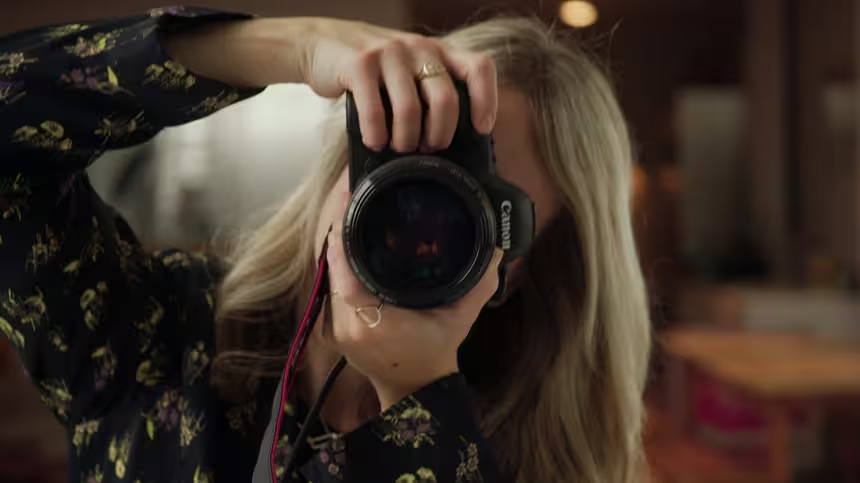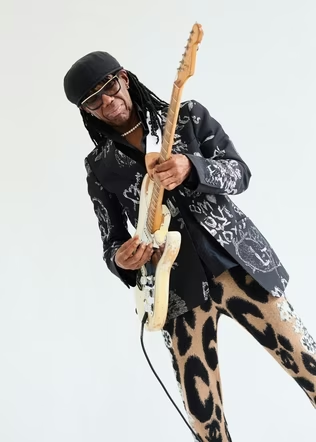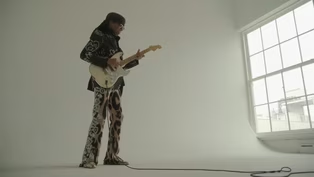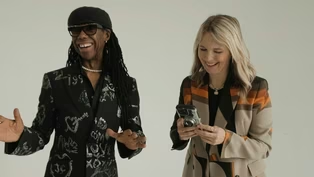
Nile Rodgers
Episode 1 | 18m 24sVideo has Closed Captions
Photographer Sophie Elgort shoots with legendary musician and producer Nile Rodgers.
Photographer Sophie Elgort shoots with legendary musician and producer Nile Rodgers as he chucks on his legendary "Hitmaker" guitar and is joined by his life partner and co-founder of the We Are Family Foundation, Nancy Hunt. Rodgers' hit music includes Chic’s “Le Freak,” Sister Sledge’s “We Are Family,” Daft Punk’s “Get Lucky” and Beyoncé’s “Cuff It.”
Problems playing video? | Closed Captioning Feedback
Problems playing video? | Closed Captioning Feedback
Portrait Mode with Sophie Elgort is a local public television program presented by WLIW PBS

Nile Rodgers
Episode 1 | 18m 24sVideo has Closed Captions
Photographer Sophie Elgort shoots with legendary musician and producer Nile Rodgers as he chucks on his legendary "Hitmaker" guitar and is joined by his life partner and co-founder of the We Are Family Foundation, Nancy Hunt. Rodgers' hit music includes Chic’s “Le Freak,” Sister Sledge’s “We Are Family,” Daft Punk’s “Get Lucky” and Beyoncé’s “Cuff It.”
Problems playing video? | Closed Captioning Feedback
How to Watch Portrait Mode with Sophie Elgort
Portrait Mode with Sophie Elgort is available to stream on pbs.org and the free PBS App, available on iPhone, Apple TV, Android TV, Android smartphones, Amazon Fire TV, Amazon Fire Tablet, Roku, Samsung Smart TV, and Vizio.

Capturing the art of conversation
In “Portrait Mode with Sophie Elgort," the photographer interviews iconic artists Nile Rodgers, Rita Moreno, Skylar Brandt and Arthur Elgort.Providing Support for PBS.org
Learn Moreabout PBS online sponsorship(upbeat music) - You are always making up sort of tunes in your head.
Just no matter what you're doing, you're always kind of composing in your head.
- Yeah, I scored my life.
- Right.
- And when I'm walking, I always have music accompaniment, always.
It just doesn't go away.
In order for me to chat with you now, I have to drown out the music that's in my head.
- Wow.
(funky music) (funky music continues) - Hi, I'm Sophie Elgort.
I'm a photographer, director, and storyteller.
I've spent the past 15 years taking photos of people in a snapshot style with the goal of documenting moments that feel like they've captured part of the subject's personality.
I've done everything from photographing and interviewing people on the streets of New York to capturing remarkable personalities for numerous publications and fashion brands.
I wanted to create this show to share my process and bring you along on a photo shoot.
When I'm photographing people, there's always a conversation going, and I feel like I learn something about the person I didn't know before.
Hopefully you are as excited as I am to get to know these remarkable artists.
Today, my guest is songwriter, producer, and guitarist Nile Rodgers.
He is the co-founder of the band Chic and has won multiple Grammys, and is in both the Rock and Roll Hall of Fame and Songwriters Hall of Fame.
Some of the hit music he's worked on includes Chic's "Le Freak," Sister Sledge's "We Are Family," Daft Punk's "Get Lucky," and Beyonce's "Cuff It."
Let's get into it.
Hi, Nile.
How you doing?
- Hey, Soph, how are you?
- Good.
Thank you so much for being here today.
I really appreciate it.
- You have no idea.
- It's an honor.
- Whenever I come to this area, because I was raised on Greenwich Street, and, like, now, it's like all bustling and wonderful and amazing and people paying millions of dollars.
When I was a child, this was all light manufacturing.
The poorest people lived here.
Almost all artists and butchers and meat packers.
So I feel a combination of love, nostalgia, and I feel old.
- No, no, not at all.
I'm excited to shoot today.
This is an amazing look.
- Thank you.
- You said you always style yourself, is that right?
- Yes, I do.
- Cool.
Well, let me get a quick shot of you here in the chair first, and then we'll go over to the actual area.
But sometimes these are the best shots.
(camera snaps) (funky music) So let's go over to cyc and take some photos.
- Okay, great.
- I figure we'll just have you here, and you can take out your guitar and just be sort of messing around, setting it up.
Does that work?
- Okay.
I can do messing around.
- Yeah.
Well, I know you can.
- I'm actually pretty good at that.
- That's why I thought it would be a good place to start, to kind of ease in, you know?
- [Nile] Grab this baby.
- [Sophie] Is this the famous guitar?
- This is the one.
1959 Fender Stratocaster, which I bought in 1973 when we were opening for The Jackson 5.
(upbeat guitar music) (upbeat guitar music continues) (camera snapping) (upbeat guitar music continues) - I'll sort of shoot you as you're playing, and once in a while, if you sort of look up my way.
(upbeat guitar music) (funky music) (camera snapping) (funky music continues) So what is the story about the guitar?
You said you got it at a pawn shop.
- Yeah.
- After you were at a day off from a gig.
- We were playing a bar, and the opening act didn't have enough time to switch gear, right?
So they would just plug into our gear.
And this young kid plugged into my guitar amp, and this kid sounded so much better than me, because I was playing a big jazz guitar, and that has a beautiful, smooth sound, it was great for playing jazz, but for playing funky R&B, it wasn't wonderful.
But when this kid plugged in and he was playing cover songs, and some of them the same ones we played, and he sounded more like the record than I did, I instantly ran out, traded my jazz guitar for this thing, which was the runt of the litter by the way.
(Sophie chuckles) And I had no idea how unique this particular instrument was.
It's honestly the only guitar in the world like it.
It's the only Strat.
And I believe probably what happened is that the guy who was making it made a mistake and did some kind of divot or cut out a chunk of wood.
And I have the thinnest head stock on any Stratocaster that exists.
- So is this the one that is called the Hitmaker?
- This is the Hitmaker.
- That you've written all the songs on?
- Yeah, this is, they called this the $2 billion guitar, because when you add up the amount of, wow, hit records, video games, television commercials, films that I've played on, it's actually earned about $2 billion in profit.
Pretty cool.
- Very cool, very cool.
Let me shoot you a couple times just while you're not talking just with it.
That's nice.
(gentle guitar music) Really nice.
(gentle guitar music continues) And can you talk about... Then you said you started the chucking, right?
- Right.
- Was that with this guitar that you started it?
- Oh, that's this.
Typically, what the electric guitar was really made for was keeping the rhythm, was keeping the vibe going.
So, if you're, you know, if you're just playing, you know, a simple song, and you're just playing... (upbeat guitar music) (camera snapping) So that's what most people would do, but I would go... (energetic guitar music) (energetic guitar music continues) - You started out playing for "Sesame Street", is that right?
One of your first sort of gigs?
- When I say started out, yes, that's when I got my first paycheck and I had to pay tax, yes.
So I did "Sesame Street", and I performed so well with "Sesame Street", the woman who was the co-star of "Sesame Street," her husband was a manager at the Apollo Theater.
- Oh.
- And a good friend of mine, Carlos Alomar, left the Apollo Theater, he was in the house band, to join David Bowie's Young Americans.
And when he left to join the Young Americans, I went and I joined the Apollo Theater house band.
- Very cool.
- Changed my life.
- That was the connection.
- Changed my life.
(gentle guitar music) - So, can I get some of you standing playing for the next shot?
I hate to interrupt this, like, gorgeous music that's happening.
- Sure you can.
- All right.
So, sort of over here.
Yeah, exactly.
You get that light.
(gentle guitar music) And feel free to move.
That's great.
(camera snapping) (gentle guitar music continues) (camera whirring) So you know what I'd love to do is, Nancy, I haven't seen any pictures of you guys together except for, like, at an event on a red carpet.
- Right.
- So I would love to take a portrait of you guys together.
(upbeat music) Get close together, I have a... Well, you're a photographer.
I have an 85 lens.
So, you know.
- Got it.
- Kind of close, as close as you sort of can get.
Exactly.
All right.
That's really nice.
So I'll do some first with some natural light.
That's really nice.
Every time I snap, just change it a little bit.
That's really nice too.
Amazing.
How did you guys meet?
- On the street.
- On the street?
- Yeah.
- 61st.
- 61st.
- Between Park and Lex.
- You just were walking down the street?
- No, me and two of my friends, one was Mick Jagger's PA, and the other was a Halstonette, Chris Royer, and the three of us were going to a party, and he was coming out of the party when we were going into the party.
And they knew him, but he was walking out in a blue plastic suit with matching hat.
And I said, "Hmm, if that's what's coming out, what's in there?"
(all laughing) But anyway.
And then my friends knew him, and we started up the conversation.
And it's longer than that, but that's the gist of it.
- Yeah.
- That's awesome.
(upbeat music) Do a couple.
That's really nice, right there.
We'll just get that on film.
Don't move.
- Oh, a Blad.
Oh, no, a Rolleiflex.
- No, it's a Rolleiflex.
- Ooh.
- I got some black and whites down in here.
So Nancy, you run the We Are Family Foundation.
- I do.
- Can you talk about a little bit how it started and what the history is there?
- So it started out as 9/11, really, and it started out as an effort for people to come together, rerecord "We Are Family," as a starting of the healing process.
And it was just a civilian effort, really.
And out of that, we decided, could that song, "We Are Family," which is so iconic around the world, could we really put that to work in a different way?
And we did.
So, about a year later, we actually created We Are Family Foundation, working with young people who are changing the world, literally, around the world.
- The Foundation works with youth.
- Youth.
Teenagers specifically.
Because as a Black Panther when he was in his teens, he was an activist.
- Living in this area.
- Living in this area, right?
And so we knew that we didn't wanna work with little, little kids, that's not our space, and we didn't wanna work with adults 'cause they're already in their own space, but we could nurture, support, and mold young people.
And these are extraordinary young people who are dealing with sex trafficking issues or climate change issues.
And they needed our support, and now we're actually working with them to get them at decision making tables.
- [Sophie] Your favorite dance move.
- Oh, well, he has a favorite dance move.
- I do?
- Yeah.
That's it.
(all laughing) - [Sophie] I think I missed it.
- [Nancy] That's okay.
(all laughing) - So I feel like I got a great portrait of you, more than one.
Thank you.
- Thank you.
- Thanks for doing that.
- Bye, baby.
Thank you.
(upbeat guitar music) - Amazing.
(camera whirring) So you say your songs always start with a chorus.
Is that right?
- Yeah.
- Why?
What's the story behind how you started doing it?
- So, we knew that that was our concept, period.
- That's just what you liked.
- So that was our philosophy, all of our songs, that philosophy, that was similar to that.
I even forced it on a few other artists.
I said to David Bowie, "I want the first words outta your mouth to be"... ♪ Let's dance - Yeah, yeah.
- Just like- - Start it out with a bang sorta.
- Yeah, like, you know, "We Are Family" goes... ♪ We are family Right away.
"Freak Out" goes... ♪ Ah, freak out Le freak, c'est chic.
So, our concept was, and it was a silly concept, but it made perfect sense to us, was a song is an excuse to go to a chorus.
A chorus is an excuse to go to a breakdown.
So, we always went to a chorus and we always went to a breakdown.
Disco was the most open format that existed.
You could be ugly, fat, Black, gay, white, it didn't make any difference.
If your song got people on the dance floor, you were cool.
- Yeah.
That's nice from the side, yeah.
(upbeat guitar music) Really nice.
So, we will do, if you have time, a few rapid fire questions.
- Sure.
- Those are super fun and quick.
- Let's go.
- Let's do it.
So just the first thing you think of, just the quick first answers that you think of.
- Euclid.
Sorry.
- Okay.
How many guitars do you have?
- Maybe about 10, 15.
- Favorite guitar?
- Hitmaker, Fender Stratocaster.
- Favorite "Sesame Street" character?
- Me!
No, I'm just kidding.
Who is my favorite?
The Count.
- Yeah, the Count.
That's a really good one.
Worst advice you've ever received?
- That "Le Freak" was the worst song that Atlantic Records had ever had, and, "Don't put it out first."
It's the biggest record in their history.
- So then these ones are "This or that?"
So, electric or acoustic?
- Electric.
- Producing or performing?
- (chuckles) Whatever I'm not doing at the time.
- Pick or no pick?
- Pick.
- "Get Lucky" or "Lose Yourself to Dance"?
- "Lose Yourself to Dance."
- Cool.
That's all I have.
Thank you.
(both chuckling) (upbeat guitar music) (camera snapping) That's great.
Amazing.
Nile, I've directed you this whole shoot, asking you to do things, and I was wondering if you would switch places with me for one minute and take a shot of me, and tell me what to do for one.
- Oh, sure.
Great.
- Is that cool?
- Yeah.
- All right.
And you just direct me and tell me what to do.
- So typically, when I'm taking a picture of a person, I just like to capture the essence of who they are.
- Okay, so should I- - So, I don't- - Should I hold a camera or something, or what do you think?
- You know what would even be cool?
What's funny is that my world is all about that thing.
- Really?
- Yeah, because that's what I carry around.
- Okay.
- Because I'm a two time cancer survivor, and I take pictures every single day.
So, after we do this, I wanna do the picture of you with my iPhone.
- I love that.
- Okay?
- Cool.
So do you want me to- - I want you to bring it out.
See, that looks too...
I want it to look like you're doing... Oh, that's cool.
(indistinct) (Sophie chuckles) - I like my picture that I have going here of you.
- Get that hand for me up.
That was okay.
It was on the slant, it was cooler.
You, it just, you were...
Okay, but look at me.
(camera snapping) And now here's the fun thing I always do, is my dreadlocks.
Can you just put your fingers in your hair and sort of... Yeah, let me get you to do it, right.
Yeah, do it.
Yeah, yeah, yeah.
That's what I like.
Cool.
- Thank you.
That's amazing.
Thank you so much for doing that.
Yeah, I love that.
That's great.
Well, I think we got it.
Thank you so much.
This was so great.
I loved meeting you.
- It was really awesome.
- Such an honor.
- Thank you.
- Thank you.
(funky music) (funky music continues) (funky music continues) (funky music continues)
Video has Closed Captions
Preview: Ep1 | 30s | Songwriter, producer and guitarist Nile Rodgers speaks with photographer Sophie Elgort. (30s)
Quick Questions with Nile Rodgers
Video has Closed Captions
Clip: Ep1 | 1m 2s | Musician Nile Rodgers answers a series of quick questions with host Sophie Elgort. (1m 2s)
Providing Support for PBS.org
Learn Moreabout PBS online sponsorship

- Arts and Music
The Best of the Joy of Painting with Bob Ross
A pop icon, Bob Ross offers soothing words of wisdom as he paints captivating landscapes.












Support for PBS provided by:
Portrait Mode with Sophie Elgort is a local public television program presented by WLIW PBS



